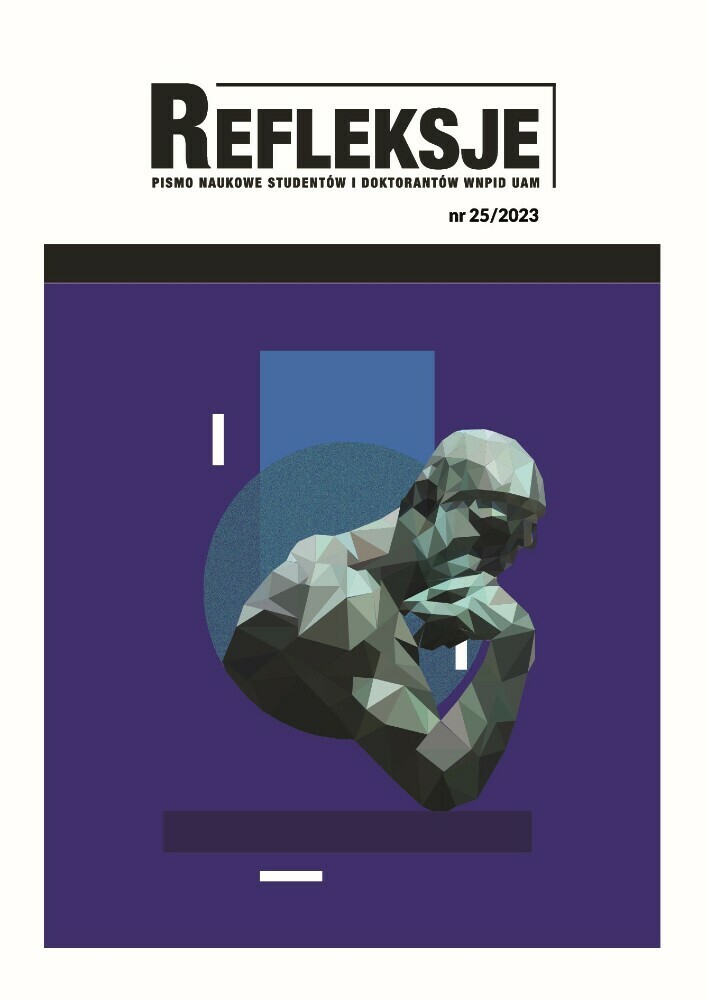Abstract
The aim of the article is this paper is to trace changes in the voting system of the Eurovision Song Contest. The research process proposes a hypothesis that despite the multiple changes to the voting system of the Eurovision Song Contest, the goal of reducing biased voting has yet to be achieved. The indications of bias during Eurovision and the differences between professional jury voting and televoting are presented. There is also a description of several activities that the main organizer of the Contest undertakes to counter voting irregularities. The author mainly focuses her attention on the years 2016–2019 and 2021–2022 because the most significant changes in voting structures and their apparent stabilization occurred during this period. The article also outlines further changes that were implemented in May 2023. The study used process tracing and comparative perspective as research methods.
References
memorable voting moments at the Eurovision Song Contest (2016), https://www.youtube.com/watch?v=1r_sk34axxw&t=3s, 22.12.2022.
A diamond day for the Eurovision Song Contest (2015), https://eurovision.tv/story/adiamond-day-for-the-eurovision-song-contest, 21.12.2022.
Bogucki M. (2014), Queerowanie Eurowizji: szesnaście lat po wyoutowaniu, „Widok. Teorie i Praktyki Kultury Wizualnej”, nr 5 http://widok.hmfactory.com/index.php/one/article/view/163/281, 20.12.2022. DOI: https://doi.org/10.36854/widok/2014.5.1142
Carniel J. (2018), Understanding the Eurovision Song Contest in multicultural Australia: We got love, Springer Nature Switzerland ag., Basel. DOI: https://doi.org/10.1007/978-3-030-02315-7
Collier D. (2011), Understanding process tracing, “PS: Political Science & Politics”, 44.4, s. 823–830. DOI: https://doi.org/10.1017/S1049096511001429
Das-Smaal E. A. (1990), Biases in categorization, „Advances in Psychology”, vol. 68, s. 349–386. DOI: https://doi.org/10.1016/S0166-4115(08)61332-1
Doda o Eurowizji i szansach Ochmana. Nie jest pełna optymizmu! (2022), https://www.youtube.com/watch?v=gQ7iPZofJ9o, 24.12.2022.
Doda żąda odwołania Eurowizji: „Wiadomo, że wygra Ukraina” (2022), https://rytmy.pl/doda-zada-odwolania-eurowizji-wiadomo-ze-wygra-ukraina/, 24.12.2022.
Dukascopy TV Eurovision. History of the brand (2016), https://www.youtube.com/watch?v=h0wgwwtispu, 20.12.2022.
EBU statement on belarusian participation (2021), https://eurovision.tv/story/ebustatement-on-belarusian-entry-2021, 22.12.2022.
EBU Statement: Irregular voting patterns during Second Semi-Final 2022 (2022), https://eurovision.tv/mediacentre/release/ebu-statement-irregular-voting-2022, 24.12.2022.
European Broadcasting Union, Rules of the 59th Eurovision Song Contest. Public version, Copenhagen 6/8/10 May (2014), https://www.ebu.ch/files/live/sites/ebu/files/publications/ebu_esc2014_rules_en.pdf, 21.12.2022.
Eurovision 2022: EBU limits contest to maximum of 44 competing countries (2021), https://wiwibloggs.com/2021/09/05/eurovision-2022-ebu-limits-contest-tomaximum-of-44-competing-countries/266533/, 20.12.2022.
Eurovision Song Contest (2020), https://www.britannica.com/art/eurovision-songcontest, 22.12.2022.
Eurovision Song Contest 2016 – Grand Final (2016), https://www.youtube.com/watch?v=no1v1-2hz6g&t=12827s, 22.12.2022.
Eurowizja 2021: które miejsce zajął Rafał Brzozowski? Te kraje zagłosowały na Polskę (2021), https://www.radiozet.pl/muzyka/eurowizja-2021-ktore-miejsce-zajal-rafal-brzozowski-i-kto-glosowal-na-polske-w-polfinale-kraje, 23.12.2022.
Eurowizja 2022: afera z głosami jurorów. Jest stanowisko TVP! (2022), https://eurowizja.org/eurowizja-tvp-glosowanie-wyniki-afera-oswiadczenie/, 24.12.2022.
Eurowizja 2022: EBU ujawnia nieprawidłowe głosy jury z Polski! Jak wyglądała nieuczciwość? (2022), https://eurowizja.org/eurowizja-2022-ebu-potwierdzaustawione-glosy-jury-z-polski/, 24.12.2022.
Eurowizja 2022: Gdzie się odbędzie? * Finał 2021: Wyniki oglądalności, głosowanie jurorskie i kontrowersje * Kto zasiadł w europejskich komisjach?
(2021), https://dziennik -eurowizyjny.pl/2021/05/24/eurowizja-2022-gdziesie-
odbedzie-final-2021-wyniki-ogladalnosci-glosowanie-jurorskie-ikontrowersje-kto-zasiadl-w-europejskich-komisjach/, 23.12.2022.
Eurowizja 2023: Analiza i reakcje na zmiany w głosowaniu. Turcja pobiła rekord awansów! • Melodifestivalen z modyfikacją zasad w dogrywce • Kto zgłosił się do Dory w Chorwacji? (2022), https://dziennik-eurowizyjny.pl/2022/11/24/eurowizja-2023-analiza-i-reakcje-na-zmiany-w-glosowaniu-turcja-pobilabyrekord-awansow-melodifestivalen-z-modyfikacja-zasad-w-dogrywce-ktozglosil-sie-do-dory-w-chorwacji/,24.12.2022.
Explanation of the new Eurovision Song Contest voting format (2016), https://www.youtube.com/watch?v=wd_rhs3f5-4&t=71s, 22.12.2022.
Flagi Kosowa, Palestyny czy Państwa Islamskiego zakazane na Eurowizji 2016? (2016), https://dziennik-eurowizyjny.pl/2016/04/29/flagi-kosowa-palestynyczy-panstwa-islamskiego-zakazane-na-eurowizji-2016/, 22.12.2022.
Fricker K., Gluhovic M. (ed.) (2013), Performing the ‘new’ Europe. Identities, feelings, and politics in the Eurovision Song Contest, Palgrave Macmillan, Houndmills.
How it works (2021), https://eurovision.tv/about/how-it-works, 21.12.2022.
In a nutshell (2021), https://eurovision.tv/history/in-a-nutshell, 22.12.2022.
Kopania-Przebindowska L. (2016), Kicz i kamp w Konkursie Eurowizji. Konkurs piosenki, kreowanie tożsamości europejskiej czy cyniczna gra?, s. 229–238, doi: 10.18778/8088-032-0.24, 20.12.2022. DOI: https://doi.org/10.18778/8088-032-0.24
Korinth B. (2018), Język narodowy jako wyróżnik tożsamości kulturowej wobec procesu integracji europejskiej na przykładzie Konkursu Piosenki Eurowizji w latach 2000–2016 „Media – Kultura – Komunikacja Społeczna”, nr 14/1,s. 79–90. DOI: https://doi.org/10.31648/mkks.2951
Lijphart A. (1971), Comparative politics and the comparative method, “American Political Science Review”, 65(Sept), s. 682–693. DOI: https://doi.org/10.2307/1955513
Morris S. (2008), Eurowizja bez wizji, “The Guardian” https://kultura.onet.pl/muzyka/gatunki/pop/eurowizja-bez-wizji/1h4t5qr, 21.12.2022.
Nowe zasady na Eurowizji. Zmiany raczej korzystne dla Polski! (2022), https://plejada.pl/newsy/eurowizja-z-nowymi-zasadami-zmiany-raczej-korzystne-dlapolski/dnn0p3c, 24.12.2022.
O’Connor J. K. (2010), The Eurovision Song Contest: The official history, Carlton, London.
Oxford Advanced Learner’s Dictionary – Bias definition, https://www.oxfordlearnersdictionaries.com/definition/english/bias_1?q=bias, 6.01.2023.
Pałuba D. (2020), Konkurs Piosenki Eurowizji jako przedmiot badania socjologicznego, „Studia Socjologiczno-Polityczne. Seria Nowa”, nr 1(12), s. 147–159.
Rules (2021), https://eurovision.tv/about/rules, 17.03.2023. DOI: https://doi.org/10.15258/istarules.2021.17
Spierdujk L., Vellekoop M. (2008), The structure of bias in peer voting systems: lessons from the Eurovision Song Contest, “Empirical Economics”, vol. 36, s. 403–425. DOI: https://doi.org/10.1007/s00181-008-0202-5
SVT explain the new voting format (2016), https://www.youtube.com/watch?v=hhrvgwldnau&t=39s, 24.03.2023.
The Eurovision Song Contest: A Non-Political Song Contest Filled With Politics (2021), https://euroculturer.eu/2021/05/19/eurovision-song-contest-a-nonpolitical-song-contest-filled-with-politics/, 20.12.2022.
The Rules of the Contest 2023 (2022), https://eurovision.tv/abou/rules#:~:text=Each%20performance%20may%20consist%20of,shall%20be%20allowed%20on%20stage.&text=All%20Contestants%20and%20artists%20competing,the%20day%20of%20the%20Final23, 20.12.2022.
Voting changes 2023 – FAQ (2022), https://eurovision.tv/voting-changes-2023-faq, 24.12.2022.
Voting systems in Eurovision history (2017), https://eurovisionworld.com/esc/votingsystems-in-eurovision-history, 22.12.2022.
Yair G., Maman D. (1996), The Persistent Structure of Hegemony in the Eurovision Song Contest, “Acta Sociologica”, vol. 39, issue 3, s. 309–325. DOI: https://doi.org/10.1177/000169939603900303


